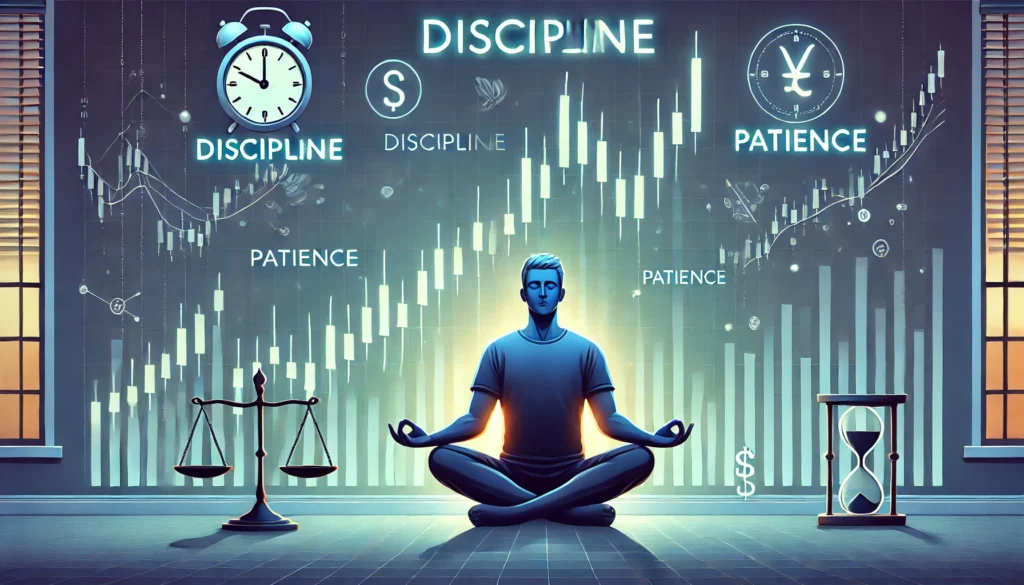Table of Contents
- The Importance of Discipline in Trading
- The Role of Patience in Trading
- Combining Discipline and Patience
- What are the Benefits?
- Practical Tips for Building
- Frequently Asked Questions (FAQ)
- 1. Why are discipline and patience important in trading?
- 2. How can I develop discipline in trading?
- 3. What is the best way to build patience as a trader?
- 4. Can I still be successful in trading if I’m not naturally disciplined?
- 5. What tools can help me stay disciplined in trading?
- 6. How do emotions like fear and greed affect trading?
- Final Thoughts

Trading with discipline and patience:
Trading in financial markets is an exciting and rewarding experience. However, it can also be difficult and stressful. Success in trading doesn’t happen by luck or guessing. Instead, it takes discipline, patience, and a good plan. Let’s look at why these qualities are so important and how they can make your trading better.
The Importance of Discipline in Trading
Discipline means sticking to your plan, even when emotions or outside events try to push you off track. In trading, discipline helps you:
- Follow Your Strategy: A good trading strategy includes rules for when to start and stop trades, how to manage risk, and how much to invest. Discipline helps you stick to these rules and avoid impulsive decisions. Learn more about creating a strong forex trading plan.
- Avoid Emotional Trading: Markets can be unpredictable, and it’s easy to let fear or greed take over. For instance, fear might make you close a trade too soon, while greed might make you hold on too long. Discipline helps you control these emotions. Discover how to control fear in forex trading.
- Manage Risks Effectively: Using stop-loss orders and setting limits on how much you risk are key to protecting your money. Discipline helps you stick to these limits and avoid overexposing yourself. Learn about forex trading with leverage.
The Role of Patience in Trading

Patience works together with discipline and is just as important in trading. It means waiting for the right opportunities and not rushing into trades. Here’s why patience is essential:
- Identifying High-Quality Trades: Not every market movement is worth trading. Patience helps you wait for setups that fit your strategy and have a better chance of success. Check out the best forex pairs for beginners to start your journey.
- Avoiding Overtrading: Overtrading happens when you make too many trades, often out of boredom or frustration. This can lead to unnecessary losses. Patience helps you focus on quality over quantity. Understand the impact of low volatility currency pairs.
- Allowing Trades to Develop: After entering a trade, patience is needed to let the market move in your favor. Exiting too soon can cut your profits short. Learn how to monitor live forex spreads.
Combining Discipline and Patience
Discipline and patience go hand in hand. Together, they form the foundation for consistent and successful trading. Here are some practical steps to combine these qualities in your trading:
1. Develop a Clear Trading Plan
A trading plan acts as your roadmap. It should outline:
- Your Goals: Define what you want to achieve, such as a specific percentage of returns or consistent monthly profits.
- Entry and Exit Rules: Identify the conditions that signal when to enter or exit a trade.
- Risk Management: Set limits on how much you’re willing to lose on a single trade or in a day.
- Trading Timeframe: Decide whether you’ll be a day trader, swing trader, or long-term investor.
Discover how to develop a trading journal to improve your discipline and planning.
2. Stick to Your Plan
Once you have a plan, the next step is to follow it without deviation. Discipline is crucial here. For instance:
- If your plan says to risk no more than 2% of your capital on a single trade, don’t increase this limit out of greed.
- Avoid making impulsive trades based on tips, news, or rumors that don’t align with your strategy.
3. Practice Patience in Execution
Patience comes into play in several ways:
- Wait for Confirmations: If your strategy relies on specific indicators, wait until all conditions are met before entering a trade. Learn about the best technical indicators for forex trading.
- Stay Calm During Drawdowns: Losing trades are inevitable. Patience helps you stick to your plan without panicking or chasing losses.
4. Keep Emotions in Check
Fear and greed are two emotions that often derail traders. Here’s how to manage them:
- Fear: Recognize that losing is part of trading. Stick to your risk management plan and view losses as a learning experience.
- Greed: Avoid the temptation to overleverage or take unnecessary risks. Remember that consistent, small gains are better than occasional big wins followed by large losses.
What are the Benefits?

When you trade with discipline and patience, you’ll notice several positive outcomes:
- Consistent Results: By following a proven strategy and managing risks, your trading becomes more predictable and reliable.
- Reduced Stress: Sticking to a plan reduces the emotional rollercoaster of trading, making the experience more enjoyable.
- Improved Decision-Making: With discipline and patience, you’ll make decisions based on logic and analysis rather than emotions.
Practical Tips for Building
If you’re struggling with discipline or patience, don’t worry. These are skills you can develop over time. Here are some tips to get started:
Start Small
Begin with a small trading account or practice on a demo account. This reduces the pressure and allows you to focus on building good habits.
Keep a Trading Journal
Record every trade you make, including the reasons behind it, the outcome, and any lessons learned. Reviewing your journal can help you identify patterns and improve your discipline.
Set Realistic Expectations
Unrealistic goals can lead to frustration and impulsive decisions. Aim for steady progress rather than overnight success.
Take Breaks
Trading can be mentally exhausting. Regular breaks help you stay focused and avoid burnout.
Learn from Mistakes
Mistakes are part of the learning process. Analyze what went wrong, adjust your strategy if needed, and move forward.
Frequently Asked Questions (FAQ)
1. Why are discipline and patience important in trading?
Discipline and patience help traders stick to their plans, avoid emotional decisions, and wait for high-quality opportunities. This leads to consistent results and reduces stress.
2. How can I develop discipline in trading?
Start by creating a clear trading plan and sticking to it. Use a trading journal to track your progress and hold yourself accountable. Practice risk management to protect your capital.
3. What is the best way to build patience as a trader?
Focus on quality over quantity. Wait for trade setups that meet all your criteria, and don’t rush into trades. Practicing mindfulness and taking breaks can also help.
4. Can I still be successful in trading if I’m not naturally disciplined?
Yes, discipline is a skill you can develop over time. Start small, learn from your mistakes, and build good habits gradually.
5. What tools can help me stay disciplined in trading?
Trading journals, demo accounts, stop-loss orders, and position sizing tools are excellent resources to keep you disciplined and focused.
6. How do emotions like fear and greed affect trading?
Fear can lead to exiting trades too early, while greed can push you to take unnecessary risks. Managing emotions is crucial to making logical and informed trading decisions.
Final Thoughts
Trading with discipline and patience is not just a mantra; it’s a proven approach that separates successful traders from the rest. By following a clear plan, managing your emotions, and staying patient, you’ll be well on your way to achieving your trading goals. Remember, trading is a journey, not a sprint. With discipline and patience, you can navigate the markets with confidence and consistency.
-
Overcoming fear and greed in forex trading
Overcoming fear and greed in forex trading:Fear and greed are two of the strongest emotions that traders face, especially in the fast-moving world of forex trading. These emotions can lead to poor decisions that cost you money. In this article, we’ll explain what fear and greed are, how they affect forex trading, and simple steps…
-
Trading with discipline and patience
Trading with discipline and patience: Trading in financial markets is an exciting and rewarding experience. However, it can also be difficult and stressful. Success in trading doesn’t happen by luck or guessing. Instead, it takes discipline, patience, and a good plan. Let’s look at why these qualities are so important and how they can make…
-
How to Control Fear in Forex Trading
How to Control Fear in Forex Trading: Fear is one of the most common emotions traders face in the forex market. Whether you’re a novice or an experienced trader, the fast-paced, high-stakes world of forex can evoke feelings of anxiety and hesitation. Fear can paralyze decision-making, lead to impulsive actions, and ultimately sabotage trading success.…



